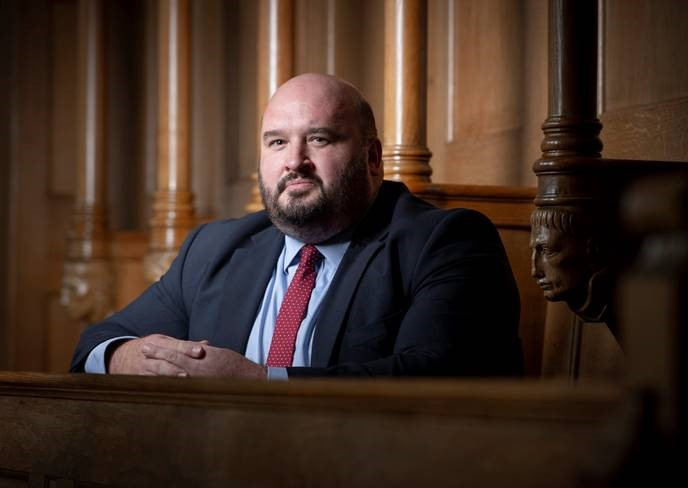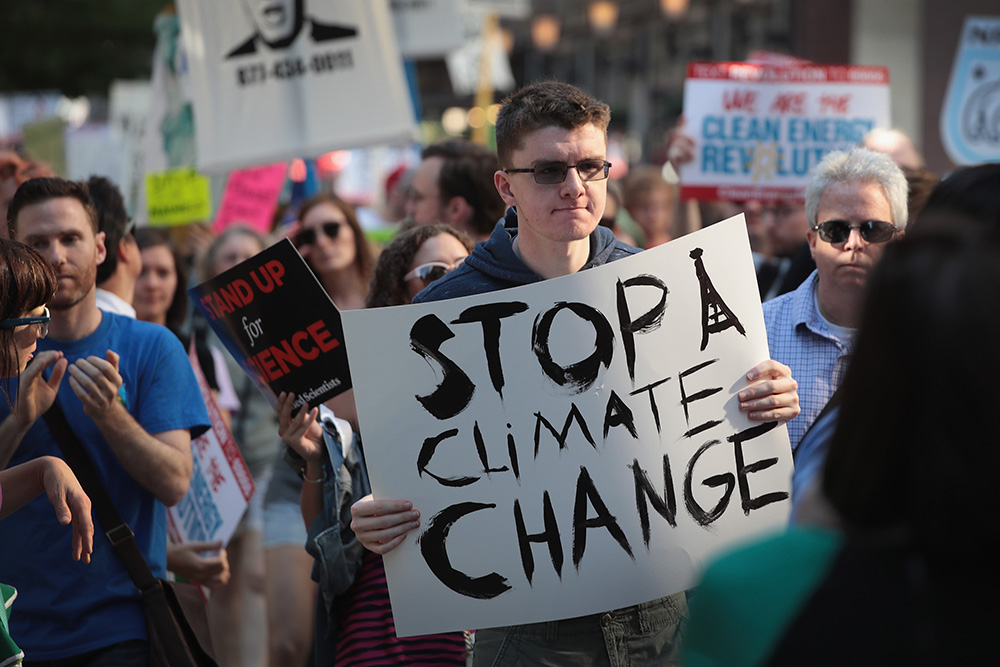
今年2月一個星期二的早晨,當愛德華·梅森走上講臺,面對臺下的石油和天然氣公司高管時,他的出現并不讓人感到意外。梅森身材瘦小、牙齒有縫,是英國圣公會委員會(也即圣公會主要投資機構)負責任投資部門的主管。
梅森和他的同事、英國圣公會養老金委員會道德與參與部門主任亞當·馬修斯經常會出席此類活動(這次是一年一度在倫敦舉辦的國際石油周),還有其他所有涉及氣候變化問題和全球各大石油和天然氣公司的活動。在這個冬日的早晨,梅森上臺介紹了英國圣公會最新的投資政策,并提出了警告。
“你們都注意到了資產剝離的運動。”他指的是一些大型投資機構正在努力撤資石油公司,以及其他被視為氣候變化罪魁禍首的行業。梅森說,圣公會希望“看到變化”,但終止投資并不是實現這一目標的最佳途徑。相反,他對臺下的高管表示,“我們會竭盡全力,讓你們參與到解決氣候變化問題的進程中去。”而同時,圣公會的耐心也是有限的。如果哪家公司拒不同意大幅減少排放,教會將別無選擇,只能改變政策。
乍一看,梅森的話似乎只是空頭威脅。圣公會坦言在石油和天然氣行業的持股量較少,因此在經濟上失去教會的支持并不會讓行業感到恐慌。但英國圣公會確實有一件法寶能引起能源公司首席執行官的注意:影響力。
梅森和馬修斯代表的機構投資者掌握了超過40萬億美元的資金,他們負責牽頭就氣候變化問題與全球最大的能源公司接觸。因此,圣公會備受關注,并被認為促使了公眾和機構對能源行業施加巨大減排壓力。
兩人已經取得了不少進展:就在梅森出席國際石油周前不久,英國能源巨頭英國石油公司宣布要在2050年之前實現“凈零排放”目標,也即盡可能地減少排放,然后利用其他方式抵消剩余的排放量。4月16日,總部位于荷蘭的殼牌公司也做出了相同的承諾,成為全球最大一家做出該承諾的能源公司。此外,殼牌公司還在新聞稿中引用了馬修斯的話。
這些成就被一場比氣候變化更迫在眉睫的危機所掩蓋了,那就是新冠肺炎大流行。盡管梅森和馬修斯也對疫情感到擔憂,但他們仍把注意力放在了另一個長期的挑戰上。這個挑戰遠在大洋彼岸,而且迄今為止,事實證明這家公司比它的歐洲同行更加難以改變。它就是埃克森美孚公司。
4月24日,圣公會宣布會在埃克森的股東大會上,與其他關注氣候問題的強大投資者一起,對整個董事會進行抗議性投票。此前,盡管結果可能并不如人意,但圣公會多次試圖讓這家總部位于美國的石油巨頭采取相關舉措。而此番聲明表明,圣公會的努力又上了一個臺階。這是兩家機構最新的一次較量,但可以肯定的是,這絕不會是最后一次。
“毀滅上帝的世界”
英國圣公會擁有486年歷史,其中一位大主教曾任石油公司高管,最高首腦則是英國女王伊麗莎白二世。圣公會似乎不太可能在氣候變化問題上扮演重要角色。畢竟,應對氣候變化幾乎已經成了格蕾塔·通貝里這類“環保少女”的代名詞,而教會僅僅為了吸引年輕人入教都費盡了心思。
更何況,圣公會似乎不僅是另一個時代的產物,它的財力也十分有限。它旗下所有的基金掌握著約140億英鎊(約合1233億元人民幣)資產,是世界上最大的宗教投資機構之一。但與大型機構養老基金和資產管理公司相比,這個數字仍顯得微不足道。例如截至今年3月31日,圣公會經常與之合作的瑞典國家養老基金AP7,其在股票基金和固定收益基金方面管理著約546億美元(約合3867億元人民幣)資金。

此外,圣公會持有的石油和天然氣公司股份也相對較小。教會的養老基金在整個石油和天然氣行業持有1620萬英鎊(約合1.42億元人民幣)普通股,圣公會委員會基金則沒有披露投資該行業的確切數字。英國石油公司和殼牌公司均被列為教會持有的最有價值的20只股票之一。
考慮到這些限制,圣公會對石油和天然氣行業的影響力更為令人驚訝。它之所以能享有話語權,一個原因是其他大型投資機構要兼顧各個利益相關方和優先事項,但圣公會可以把應對氣候變化當作工作重心。從2014年起,圣公會委員會開始在年報中將應對氣候變化列為負責任投資的重點。而在2017年,圣公會聯合創立了“過渡路徑行動”,這家設在倫敦政治經濟學院的中心將幫助資產管理公司追蹤各公司應對氣候變化的政策。今年2月,圣公會把這一戰略推廣到了自家業務,承諾將在2030年前使成千上萬座陰冷古老的教堂和大教堂實現碳中和。
圣公會代表的不僅有自己的基金,還有其他財力雄厚的投資機構,通過牽頭努力來提高自己的影響力。它代表了機構投資團體“氣候行動100+”,和其他投資機構共同牽頭,與英國石油公司、殼牌公司和埃克森美孚進行接觸。“氣候行動100+”的成員包括貝萊德公司,團體共掌握價值40萬億美元的資產,并明確致力于改變各公司的氣候政策。
關注氣候變化的投資團體認為,圣公會是踐行這種合作方式的先行者,特別是在與石油公司就減排目標和游說活動直接接觸時,圣公會起到了開拓性的作用。Boston Trust Walden是一家專門從事ESG資產管理的公司,其ESG股東參與部門主任蒂莫西·史密斯曾擔任美國不同宗教信仰者間共同責任中心執行董事。他表示,英國圣公會在2018年與AP7合作,公開指出多家歐洲公司在幕后游說反對制定應對氣候變化政策,這為他們在美國開展類似行動帶來了啟發。史密斯說:“其他人都沒有行動,而他們卻這么做了。”對于越來越多將氣候變化問題作為投資組合重心的投資機構而言,圣公會的做法為它們提供了一種模式。
由聯合國支持的Principles for Responsible Investing組織首席執行官菲奧娜·雷諾茲指出:“他們完成了超出自己能力的事。”該組織也是“氣候行動100+”的成員。
圣公會之所以能在應對氣候變化投資領域發揮巨大作用,除了策略以外,梅森和馬修斯認為這也歸功于一些世俗投資機構不具備的品質:道德責任感。像貝萊德這樣的公司必須仔細論證氣候政策在財務風險和回報方面的合理性,但圣公會設有一個由投資顧問和宗教領袖組成的理事會,可以在財務和神學方面提供支持。
正如史密斯所說:“用宗教術語來說,他們擔心上帝的世界會遭到深層的毀滅,這種情況將會發生,而且現在就已經發生了。”
“以前差距很大,現在反而更大了”
盡管歐洲主要能源公司似乎終于改變了氣候相關的政策,但在大西洋彼岸,美國最大的石油和天然氣上市公司埃克森美孚依舊是圣公會需要討伐的對象。
埃克森美孚通常被視為美國石油和天然氣行業的領頭羊,但它規模極其龐大,影響力遠遠超出了其位于得克薩斯州歐文的公司總部。它是僅次于殼牌和英國石油公司的全球第三大石油和天然氣上市公司,業務遍布6大洲45個國家,2019年營收額和其他收入總和近2650億美元。埃克森美孚的任何政策轉變,不僅會代表美國能源行業的重要轉折點,也可能成為一個契機,迫使其他大公司也走上同樣的道路。

2017年,圣公會在埃克森年度股東大會上提交了一份股東議案,要求公司披露氣候變化對業務產生的影響。該議案以62%的股東票數獲得通過。自2018年以來,埃克森每年都會公布《能源和碳摘要》報告,說明氣溫上升對業務的影響。
此后,圣公會開始與埃克森公司直接接觸。2018年,梅森與紐約州共同養老基金合作,代表“氣候行動100+”直接與該公司對話。由于私下談話鮮有進展,圣公會開始通過公開場合發聲,試圖在公司年度股東大會上就氣候政策問題提出股東議案。
但自2017年以來,圣公會的做法只取得了有限的進展。新的股東議案要么無法通過,要么在美國證交會的支持下被剔除在了代理投票表決議題之外。今年,英國圣公會的一項提案要求埃克森美孚設定與《巴黎氣候協定》相一致的減排目標,但這項議案已經連續第二年遭到否決。其他投資者就氣候政策和游說內幕披露事宜提出的議案雖然進入了投票環節,但至今未能獲得多數贊同。梅森在今年2月表示,“氣候行動100+”仍在與埃克森公司合作,“但我們對聽到的消息并不滿意”。
到了今年4月,雙方的關系似乎愈發緊張。4月24日,圣公會和紐約州共同養老基金宣布,它們將在5月的年度股東大會上投票反對埃克森美孚董事會,以此抗議該公司的氣候政策,并敦促其他股東也一起投票反對。
埃克森美孚則否認自己拒不對氣候變化采取行動。在回應圣公會指責其在氣候問題上不愿讓步時,它提供了一份應對氣候變化政策的摘要。該公司并未直接回應英國圣公會或其他批評者,也沒有確認是否加入了“氣候行動100+”。公司表示自己致力于遵守《巴黎協定》并與之保持一致,在政治獻金方面也做到了公開透明。它在今年3月表示,公司在2017至2020年間的甲烷排放減少了20%。據國際能源署的數據顯示,這種強大的溫室氣體占到全球能源相關排放的6%。
埃克森美孚還指出,它有充分理由否決圣公會和其他投資者就氣候政策提出的議案。今年,該公司就圣公會提出的排放目標議案向美國證交會發表聲明,稱該議案被擱置是因為它“虛假且有誤導性”。議案企圖對埃克森美孚進行微觀管理,而這其實沒有必要,因為公司已經“在實質上實行了”減少排放的提案。
一些ESG專家表示,圣公會在與英國石油、殼牌公司等歐洲石油巨頭打交道時成效顯著,但卻無法與埃克森美孚達成一致,這在很大程度上取決于政治因素,尤其是美國和歐洲在氣候變化問題上存有巨大分歧。
牛津大學賽德商學院副研究員、該校社會融資和影響力投資項目聯合主任蓋爾·彼得森認為,投資者在這個問題上的立場通常“反映了當地的政治傾向”。Principles for Responsible Investing的菲奧娜·雷諾茲則表示,對美國和歐洲的大企業而言,“它們的觀念完全不同”,而且歐洲各國政府在制定氣候變化政策方面遙遙領先。

2019年底,特朗普政府正式宣布美國將退出《巴黎協定》。此前,特朗普首次于2017年承諾將退出該協定。與此同時,英國和歐盟各國政府參與應對氣候變化的意愿要強得多。英國和歐盟都目標在2050年前實現凈零排放。馬修斯表示,隨著殼牌公司在今年4月做出同樣的承諾,美國和歐洲的差距越來越大:“以前差距很大,現在反而更大了。”
如今,還有一個因素使得向埃克森美孚等行動遲緩的公司施壓的努力變得更加復雜:新冠肺炎大流行。據國際能源署稱,今年全球石油需求量可能會因為封城措施減少930萬桶/天——而且前提是2020年下半年開始需求有所恢復。
雖然需求疲軟可能在短期內遏制溫室氣體排放,但這也威脅到了能源公司的財務健康,即使是最大的公司也承諾減產,并宣布了停薪休假和裁員計劃。英格蘭銀行前行長馬克·卡尼在今年3月警告稱,廣泛的經濟影響(更不用說世界各國轉而抗擊疫情所帶來的干擾),有可能會減少資金投入和減排運動的緊迫性。國際能源署執行干事法提赫·比羅爾則表示,這場危機其實是對全球各家企業是否會兌現承諾、繼續應對氣候變化的一場考驗。
不過在今年2月,早在新冠大流行來襲或殼牌公司宣布凈零目標之前,梅森就警告說,在氣候變化和商業問題上,世界正在迅速變化。
他表示:“埃克森美孚自欺欺人,說什么‘啊呀,一切都會和以前一樣的’,但事實并非如此。”(財富中文網)
譯者:智竑
今年2月一個星期二的早晨,當愛德華·梅森走上講臺,面對臺下的石油和天然氣公司高管時,他的出現并不讓人感到意外。梅森身材瘦小、牙齒有縫,是英國圣公會委員會(也即圣公會主要投資機構)負責任投資部門的主管。
梅森和他的同事、英國圣公會養老金委員會道德與參與部門主任亞當·馬修斯經常會出席此類活動(這次是一年一度在倫敦舉辦的國際石油周),還有其他所有涉及氣候變化問題和全球各大石油和天然氣公司的活動。在這個冬日的早晨,梅森上臺介紹了英國圣公會最新的投資政策,并提出了警告。
“你們都注意到了資產剝離的運動。”他指的是一些大型投資機構正在努力撤資石油公司,以及其他被視為氣候變化罪魁禍首的行業。梅森說,圣公會希望“看到變化”,但終止投資并不是實現這一目標的最佳途徑。相反,他對臺下的高管表示,“我們會竭盡全力,讓你們參與到解決氣候變化問題的進程中去。”而同時,圣公會的耐心也是有限的。如果哪家公司拒不同意大幅減少排放,教會將別無選擇,只能改變政策。
乍一看,梅森的話似乎只是空頭威脅。圣公會坦言在石油和天然氣行業的持股量較少,因此在經濟上失去教會的支持并不會讓行業感到恐慌。但英國圣公會確實有一件法寶能引起能源公司首席執行官的注意:影響力。
梅森和馬修斯代表的機構投資者掌握了超過40萬億美元的資金,他們負責牽頭就氣候變化問題與全球最大的能源公司接觸。因此,圣公會備受關注,并被認為促使了公眾和機構對能源行業施加巨大減排壓力。
兩人已經取得了不少進展:就在梅森出席國際石油周前不久,英國能源巨頭英國石油公司宣布要在2050年之前實現“凈零排放”目標,也即盡可能地減少排放,然后利用其他方式抵消剩余的排放量。4月16日,總部位于荷蘭的殼牌公司也做出了相同的承諾,成為全球最大一家做出該承諾的能源公司。此外,殼牌公司還在新聞稿中引用了馬修斯的話。
這些成就被一場比氣候變化更迫在眉睫的危機所掩蓋了,那就是新冠肺炎大流行。盡管梅森和馬修斯也對疫情感到擔憂,但他們仍把注意力放在了另一個長期的挑戰上。這個挑戰遠在大洋彼岸,而且迄今為止,事實證明這家公司比它的歐洲同行更加難以改變。它就是埃克森美孚公司。
4月24日,圣公會宣布會在埃克森的股東大會上,與其他關注氣候問題的強大投資者一起,對整個董事會進行抗議性投票。此前,盡管結果可能并不如人意,但圣公會多次試圖讓這家總部位于美國的石油巨頭采取相關舉措。而此番聲明表明,圣公會的努力又上了一個臺階。這是兩家機構最新的一次較量,但可以肯定的是,這絕不會是最后一次。
“毀滅上帝的世界”
英國圣公會擁有486年歷史,其中一位大主教曾任石油公司高管,最高首腦則是英國女王伊麗莎白二世。圣公會似乎不太可能在氣候變化問題上扮演重要角色。畢竟,應對氣候變化幾乎已經成了格蕾塔·通貝里這類“環保少女”的代名詞,而教會僅僅為了吸引年輕人入教都費盡了心思。
更何況,圣公會似乎不僅是另一個時代的產物,它的財力也十分有限。它旗下所有的基金掌握著約140億英鎊(約合1233億元人民幣)資產,是世界上最大的宗教投資機構之一。但與大型機構養老基金和資產管理公司相比,這個數字仍顯得微不足道。例如截至今年3月31日,圣公會經常與之合作的瑞典國家養老基金AP7,其在股票基金和固定收益基金方面管理著約546億美元(約合3867億元人民幣)資金。
此外,圣公會持有的石油和天然氣公司股份也相對較小。教會的養老基金在整個石油和天然氣行業持有1620萬英鎊(約合1.42億元人民幣)普通股,圣公會委員會基金則沒有披露投資該行業的確切數字。英國石油公司和殼牌公司均被列為教會持有的最有價值的20只股票之一。
考慮到這些限制,圣公會對石油和天然氣行業的影響力更為令人驚訝。它之所以能享有話語權,一個原因是其他大型投資機構要兼顧各個利益相關方和優先事項,但圣公會可以把應對氣候變化當作工作重心。從2014年起,圣公會委員會開始在年報中將應對氣候變化列為負責任投資的重點。而在2017年,圣公會聯合創立了“過渡路徑行動”,這家設在倫敦政治經濟學院的中心將幫助資產管理公司追蹤各公司應對氣候變化的政策。今年2月,圣公會把這一戰略推廣到了自家業務,承諾將在2030年前使成千上萬座陰冷古老的教堂和大教堂實現碳中和。
圣公會代表的不僅有自己的基金,還有其他財力雄厚的投資機構,通過牽頭努力來提高自己的影響力。它代表了機構投資團體“氣候行動100+”,和其他投資機構共同牽頭,與英國石油公司、殼牌公司和埃克森美孚進行接觸。“氣候行動100+”的成員包括貝萊德公司,團體共掌握價值40萬億美元的資產,并明確致力于改變各公司的氣候政策。
關注氣候變化的投資團體認為,圣公會是踐行這種合作方式的先行者,特別是在與石油公司就減排目標和游說活動直接接觸時,圣公會起到了開拓性的作用。Boston Trust Walden是一家專門從事ESG資產管理的公司,其ESG股東參與部門主任蒂莫西·史密斯曾擔任美國不同宗教信仰者間共同責任中心執行董事。他表示,英國圣公會在2018年與AP7合作,公開指出多家歐洲公司在幕后游說反對制定應對氣候變化政策,這為他們在美國開展類似行動帶來了啟發。史密斯說:“其他人都沒有行動,而他們卻這么做了。”對于越來越多將氣候變化問題作為投資組合重心的投資機構而言,圣公會的做法為它們提供了一種模式。
由聯合國支持的Principles for Responsible Investing組織首席執行官菲奧娜·雷諾茲指出:“他們完成了超出自己能力的事。”該組織也是“氣候行動100+”的成員。
圣公會之所以能在應對氣候變化投資領域發揮巨大作用,除了策略以外,梅森和馬修斯認為這也歸功于一些世俗投資機構不具備的品質:道德責任感。像貝萊德這樣的公司必須仔細論證氣候政策在財務風險和回報方面的合理性,但圣公會設有一個由投資顧問和宗教領袖組成的理事會,可以在財務和神學方面提供支持。
正如史密斯所說:“用宗教術語來說,他們擔心上帝的世界會遭到深層的毀滅,這種情況將會發生,而且現在就已經發生了。”
“以前差距很大,現在反而更大了”
盡管歐洲主要能源公司似乎終于改變了氣候相關的政策,但在大西洋彼岸,美國最大的石油和天然氣上市公司埃克森美孚依舊是圣公會需要討伐的對象。
埃克森美孚通常被視為美國石油和天然氣行業的領頭羊,但它規模極其龐大,影響力遠遠超出了其位于得克薩斯州歐文的公司總部。它是僅次于殼牌和英國石油公司的全球第三大石油和天然氣上市公司,業務遍布6大洲45個國家,2019年營收額和其他收入總和近2650億美元。埃克森美孚的任何政策轉變,不僅會代表美國能源行業的重要轉折點,也可能成為一個契機,迫使其他大公司也走上同樣的道路。
2017年,圣公會在埃克森年度股東大會上提交了一份股東議案,要求公司披露氣候變化對業務產生的影響。該議案以62%的股東票數獲得通過。自2018年以來,埃克森每年都會公布《能源和碳摘要》報告,說明氣溫上升對業務的影響。
此后,圣公會開始與埃克森公司直接接觸。2018年,梅森與紐約州共同養老基金合作,代表“氣候行動100+”直接與該公司對話。由于私下談話鮮有進展,圣公會開始通過公開場合發聲,試圖在公司年度股東大會上就氣候政策問題提出股東議案。
但自2017年以來,圣公會的做法只取得了有限的進展。新的股東議案要么無法通過,要么在美國證交會的支持下被剔除在了代理投票表決議題之外。今年,英國圣公會的一項提案要求埃克森美孚設定與《巴黎氣候協定》相一致的減排目標,但這項議案已經連續第二年遭到否決。其他投資者就氣候政策和游說內幕披露事宜提出的議案雖然進入了投票環節,但至今未能獲得多數贊同。梅森在今年2月表示,“氣候行動100+”仍在與埃克森公司合作,“但我們對聽到的消息并不滿意”。
到了今年4月,雙方的關系似乎愈發緊張。4月24日,圣公會和紐約州共同養老基金宣布,它們將在5月的年度股東大會上投票反對埃克森美孚董事會,以此抗議該公司的氣候政策,并敦促其他股東也一起投票反對。
埃克森美孚則否認自己拒不對氣候變化采取行動。在回應圣公會指責其在氣候問題上不愿讓步時,它提供了一份應對氣候變化政策的摘要。該公司并未直接回應英國圣公會或其他批評者,也沒有確認是否加入了“氣候行動100+”。公司表示自己致力于遵守《巴黎協定》并與之保持一致,在政治獻金方面也做到了公開透明。它在今年3月表示,公司在2017至2020年間的甲烷排放減少了20%。據國際能源署的數據顯示,這種強大的溫室氣體占到全球能源相關排放的6%。
埃克森美孚還指出,它有充分理由否決圣公會和其他投資者就氣候政策提出的議案。今年,該公司就圣公會提出的排放目標議案向美國證交會發表聲明,稱該議案被擱置是因為它“虛假且有誤導性”。議案企圖對埃克森美孚進行微觀管理,而這其實沒有必要,因為公司已經“在實質上實行了”減少排放的提案。
一些ESG專家表示,圣公會在與英國石油、殼牌公司等歐洲石油巨頭打交道時成效顯著,但卻無法與埃克森美孚達成一致,這在很大程度上取決于政治因素,尤其是美國和歐洲在氣候變化問題上存有巨大分歧。
牛津大學賽德商學院副研究員、該校社會融資和影響力投資項目聯合主任蓋爾·彼得森認為,投資者在這個問題上的立場通常“反映了當地的政治傾向”。Principles for Responsible Investing的菲奧娜·雷諾茲則表示,對美國和歐洲的大企業而言,“它們的觀念完全不同”,而且歐洲各國政府在制定氣候變化政策方面遙遙領先。
2019年底,特朗普政府正式宣布美國將退出《巴黎協定》。此前,特朗普首次于2017年承諾將退出該協定。與此同時,英國和歐盟各國政府參與應對氣候變化的意愿要強得多。英國和歐盟都目標在2050年前實現凈零排放。馬修斯表示,隨著殼牌公司在今年4月做出同樣的承諾,美國和歐洲的差距越來越大:“以前差距很大,現在反而更大了。”
如今,還有一個因素使得向埃克森美孚等行動遲緩的公司施壓的努力變得更加復雜:新冠肺炎大流行。據國際能源署稱,今年全球石油需求量可能會因為封城措施減少930萬桶/天——而且前提是2020年下半年開始需求有所恢復。
雖然需求疲軟可能在短期內遏制溫室氣體排放,但這也威脅到了能源公司的財務健康,即使是最大的公司也承諾減產,并宣布了停薪休假和裁員計劃。英格蘭銀行前行長馬克·卡尼在今年3月警告稱,廣泛的經濟影響(更不用說世界各國轉而抗擊疫情所帶來的干擾),有可能會減少資金投入和減排運動的緊迫性。國際能源署執行干事法提赫·比羅爾則表示,這場危機其實是對全球各家企業是否會兌現承諾、繼續應對氣候變化的一場考驗。
不過在今年2月,早在新冠大流行來襲或殼牌公司宣布凈零目標之前,梅森就警告說,在氣候變化和商業問題上,世界正在迅速變化。
他表示:“埃克森美孚自欺欺人,說什么‘啊呀,一切都會和以前一樣的’,但事實并非如此。”(財富中文網)
譯者:智竑
By the time Edward Mason stepped up to the lectern in front of a crowd of oil and gas executives on a Tuesday morning in February, the presence of the slight, gap-toothed head of responsible investment at the Church Commissioners for England—the main investment vehicle of the Church of England—should not have come as a surprise.
Mason and his colleague Adam Matthews, director of ethics and engagement at the Church’s pension board, have become a regular presence at events like this one—the annual International Petroleum Week in London—and everywhere else climate change and the world’s largest oil and gas companies are discussed. On this winter morning, Mason was using his time on stage to provide an update on the Church’s investment policies—and to deliver a warning.
“You’ll all be aware of the divestment movement,” he said, referring to the push among some large investors to withdraw funds backing oil companies, and other sectors seen as major contributors to climate change. The Church wants “to see change”, said Mason, but does not believe that ending their investment is the best way to meet that goal. Instead, he told executives, “we will strain every sinew to help you become part of the solution to climate change.” At the same time, there’s a limit to the Church’s patience, says Mason. If companies do not get on board with dramatically reducing emissions, his organization will have no choice but to reverse its policy.
At first glance, Mason’s statement appears to be something of an empty threat. The Church admits its holdings in the oil and gas sector are relatively minor, so the possible loss of its financial backing does not exactly have the industry running scared. But the Church of England does have something that gets the attention of energy CEOs: influence.
Mason and Matthews lead engagement on climate change with the world’s biggest energy companies on behalf of a group of institutional investors representing over $40 trillion. As a result, the Church commands attention and has been credited with driving a wave of public and institutional pressure on the industry to cut emissions.
The pair have had some wins: shortly before Mason’s appearance at IP Week, British energy giant BP announced it would aim for ‘net zero’—meaning it would reduce emissions as much as possible, then offset the remainder—by 2050. On April 16, Royal Dutch Shell, based in the Netherlands, announced it had made the same commitment, becoming the largest energy company in the world to do so—and quoted Matthews in its press release.
That accomplishment was overshadowed by a crisis more immediate than climate change—the COVID-19 pandemic. But despite their concerns about the virus, Mason and Matthews are staying focused on another longterm challenge, one that lies on the other side of the ocean, and has so far proved more resistant to change than its European counterparts: ExxonMobil.
April 24, the Church's repeated, if not overly successful, efforts to bring that U.S.-based giant to heel ratcheted up a level when it announced on Friday that it, along with other powerful climate-focused investors, would issue a protest vote against Exxon's entire board at it's upcoming general meeting. It's the latest blow in the battle between the two institutions—but almost certainly not the last.
‘Destruction of God’s world’
The Church of England—a 486-year-old institution with a former oil executive for an Archbishop and Queen Elizabeth II at its head—might seem like an unlikely candidate to play the climate change heavy. After all, the movement to act on climate change has become all but synonymous with youth activists like Greta Thunberg, while the Church struggles to even coax young people through its doors.
And not only does the Church seem, at least at first glance, to be a relic from another age, but its financial firepower is also limited. With a total of roughly GBP 14 billion (or about $17.73 billion) under management across all of its funds, it’s one of the world’s largest religious investors—but remains a relative minnow compared to large institutional pension funds and asset managers. By comparison, a frequent collaborator—the national Swedish pension fund, AP7—had about $54.6 billion assets under management between its equity and fixed income funds as of March 31.
What’s more, its oil and gas holdings are also relatively modest. The Church’s pension fund holds GBP 16.2 million ($19.9 million) in common stock across the oil and gas sector as a whole, while its Church Commissioners fund doesn’t disclose exact figures for the sector; both BP and Shell are listed as among its top twenty most valuable equity holdings.
Given those limitations, the Church’s ability to command the attention of the oil and gas sector is all the more surprising. One of the ways it's managed to hold sway is by committing to make climate change a focus in a way other large investors, juggling multiple stakeholders and priorities, do not. From 2014 onwards, the Church Commissioners' annual reports listed climate change as a major responsible investing priority, and in 2017, the Church co-founded the Transition Pathway Initiative, a centre at the London School of Economics to help asset managers track companies’ climate change policies. In February, the Church expanded that strategy to its own operations, committing to make hundreds of thousands of drafty, ancient churches and cathedrals carbon neutral by 2030.
It’s also bolstered its clout by leading efforts not just on behalf of its own funds, but for other investors with far deeper pockets. The Church co-leads engagement efforts with other investors on BP, Shell, and ExxonMobil on behalf of Climate Action 100+, an institutional investor group that covers $40 trillion worth of assets, including BlackRock, and explicitly works to shift companies’ climate policies.
Climate investment groups credit the Church as a pioneer of this cooperative approach, particularly when it comes to engaging directly with oil companies on emissions reductions targets, and on their lobbying practices. A Church-led effort with AP7 to call out European companies’ behind-the-scenes lobbying against climate change policies, in 2018, provided the inspiration for a similar effort in the U.S., says Timothy Smith, director of ESG shareowner engagement at Boston Trust Walden, an ESG-specialized asset manager, and former executive director at the U.S.-based Interfaith Center on Corporate Responsibility. “They did this when nobody else was doing it,” he says. And more broadly, the Church’s approach has provided a model for a growing number of investors that are beginning to put climate change at the center of their portfolios.
“They very much punch above their weight,” says Fiona Reynolds, CEO of the UN-backed Principles for Responsible Investing, which is also a member of Climate Action 100+.
Beyond tactics, Mason and Matthews attribute the Church’s outsized role in climate change investment to having something secular investors do not: a moral imperative. While companies like BlackRock must carefully justify their climate policies in terms of financial risk and reward, the Church has a council of investment advisors and religious leaders to provide both the financial and theological backing to its approach.
As Smith puts it: “To use religious terms: they’re worried about the deep destruction of God’s world, that will occur—and is occurring.”
‘The gap was large, and now it’s even larger.’
But while major European energy companies appear to finally be shifting their climate-related policies, across the Atlantic, America's largest publicly traded oil and gas company, ExxonMobil, has been—and remains—the Church’s white whale.
The company is often treated as a bellwether for the U.S. oil and gas sector as a whole, but its sheer scale gives it influence far beyond its headquarters in Irving, Texas. After Shell and BP, it is the third largest publicly traded oil and gas company in the world, operating in 45 countries on six continents, and pulling in nearly $265 billion in revenue and other income in 2019. Any shifts in Exxon’s policies wouldn't just represent a major pivot in the future of U.S. energy—but could be a tipping point that would force other major companies to follow the same path.
In 2017, a shareholder proposal brought by the Church to Exxon's annual general meeting to force the company to disclose the impact of climate change on its business passed with 62% of the shareholder vote. Since 2018, Exxon has released annual "Energy and Carbon Summary" reports on how rising temperatures will impact its business.
The Church followed that win with engagement directly with Exxon, when Mason began speaking directly to the company in 2018 on behalf of Climate Action 100+, working with the New York State Common Retirement Fund. With little sign of progress from its private conversations, the Church has also continued to use the public route, attempting to introduce shareholder proposals on climate policy at the company’s Annual General Meetings.
But since 2017, the approach has only gained limited ground, with further shareholder proposals either failing to pass, or being struck off the proxy ballot with the backing of the SEC. This year, a Church of England proposal asking the company to set emissions reduction targets consistent with the Paris Climate Agreement was struck from the ballot for the second consecutive year. Other climate-related proposals on climate policies and lobbying disclosures brought by other investors have made it to the ballot, but have so far failed to gain a majority vote. In February, Mason said Climate Action 100+ is still engaging with Exxon, “but we’re not happy with what we’re hearing.”
By April, that relationship appeared increasingly tense. On April 24, the Church and the New York Common State Retirement Fund announced they would vote against Exxon's full board at its Annual General Meeting in May—in protest over the company's climate policies—and urged other shareholders to do the same.
Exxon, for its part, denies being a climate change holdout. In a response to the Church’s description of a company that refuses to budge on the subject, Exxon provided a summary of its policies on climate change; it did not address the Church of England or other critics directly, and did not confirm that it engages with Climate Action 100+. The company says it is committed to and aligned with the Paris Agreement, and is transparent about political donations. In March, the company said it had reduced its methane emissions—a potent greenhouse gas that the International Energy Agency says is equal to 6% of global energy-related emissions—by 20% between 2017 and 2020.
Exxon also says it had good reasons for striking down shareholder proposals brought by the Church and other investors on its climate policies. In its statement to the SEC this year on the Church’s proposal on emissions targets, the company said the proposal was dropped because it was “false and misleading”, sought to micromanage the company, and was ultimately unnecessary, since the company had already “substantially implemented” the proposal to cut emissions.
The question of why the Church, so effective when engaging with European giants like BP and Shell, has failed to find traction with Exxon largely comes down to politics, say ESG experts—and specifically the gaping divide between the U.S. and Europe on the subject of climate change.
Investors’ stance on the issue tends to “mirror the politics of that place,” says Gayle Peterson, an associate fellow at the University of Oxford’s Sa?d Business School, and co-director of its social finance and impact investing programs. For major corporations in the U.S. versus Europe, “there’s a very different mindset,” says Fiona Reynolds, of PRI, adding that European governments are much further ahead on climate change policy.
In late 2019, the Trump Administration gave official notice it would pull out of the Paris Agreement, after first promising to leave the accord in 2017. Meanwhile, the governments of the U.K. and EU have been far more willing to engage with the issue; both are targeting net zero emissions by 2050. And with Shell’s April commitment to do the same, the U.S. and Europe have drifted even further apart, says Matthews: “The gap was large, and now it’s even larger.”
Now, there’s yet another factor complicating the efforts to pressure Exxon and other companies flagged as climate laggards: the coronavirus pandemic. The International Energy Agency says demand for oil due to global lockdowns is likely to drop by 9.3 million barrels per day this year—and that’s assuming demand starts to recover in the second half of 2020.
While anemic demand is likely to curb emissions in the short term, it also threatens the financial health of energy companies, with even the largest pledging production cuts and announcing furloughs and layoffs. The broad economic fallout—not to mention the distraction, as the world pivots to focus on combating the virus—risks reducing the capital and urgency driving the movement to reduce emissions, former Bank of England governor Mark Carney warned in March. Indeed, this crisis represents a test of whether companies worldwide will even stick to the climate commitments they've already made, said the IEA's executive director, Fatih Birol.
But in February, even before the arrival of the coronavirus pandemic or the announcement of Shell’s new net zero target, Mason warned when it comes to climate change and business, the world is changing very fast.
“Exxon has its fingers in its ears, and is saying, you know, ‘la, la, la, things are going to be the same as they’ve always been’,” he said. “And they’re not.”






